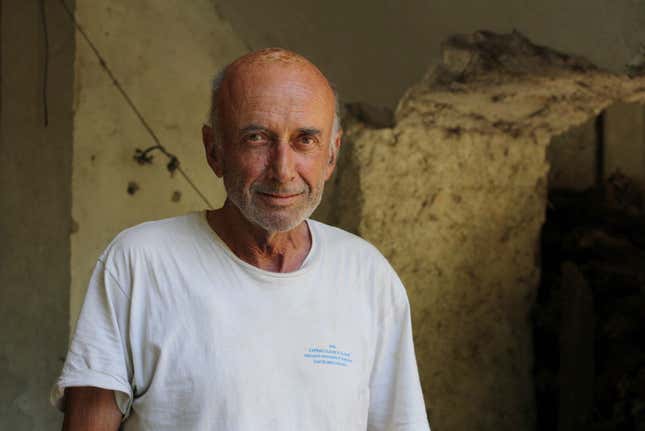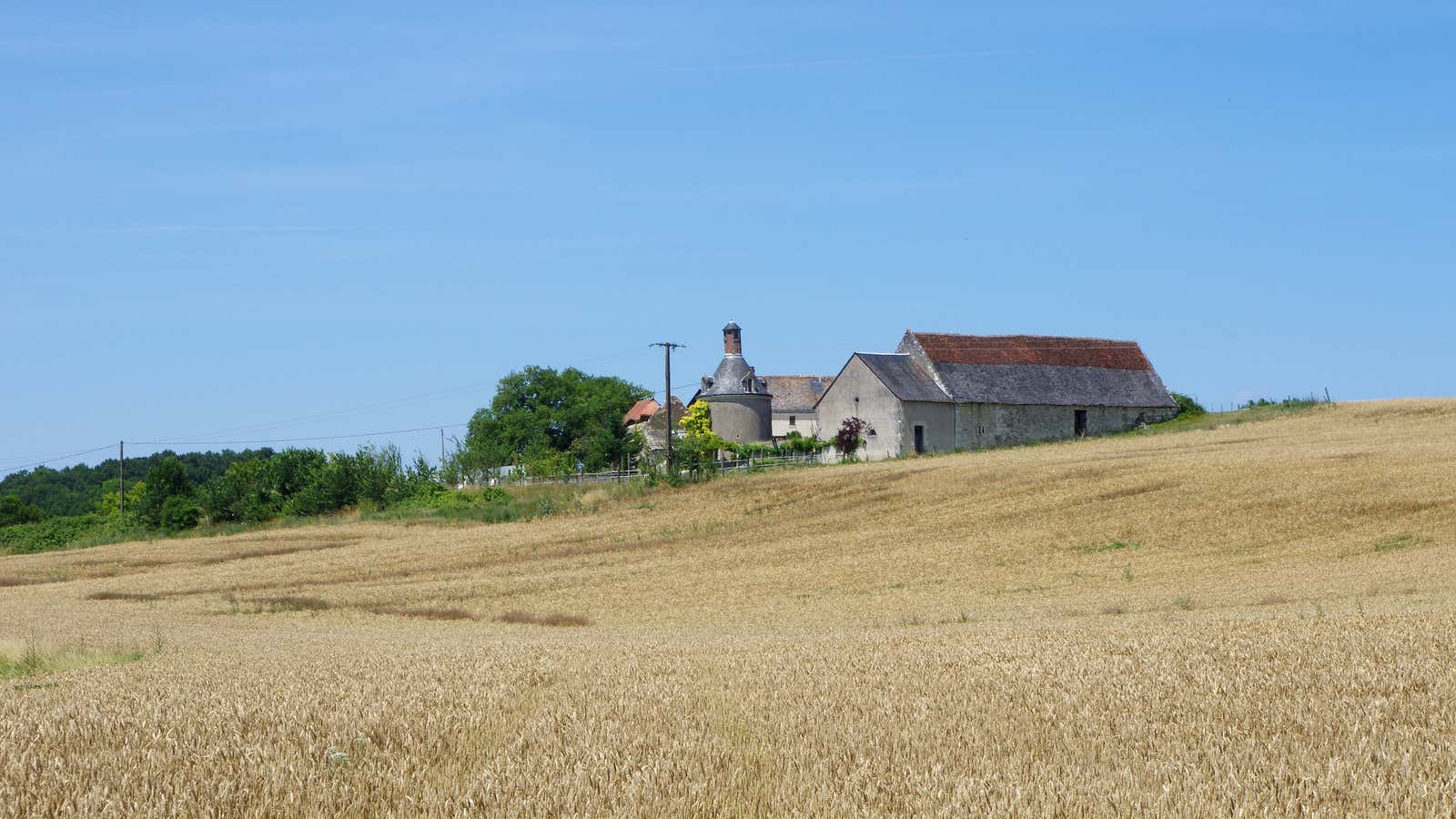SAINT-GENIÈS-DE-MALGOIRÈS, France – French farmer Nicolas Duntze remembers a time when school did not begin until late October, so the entire community could participate in the local harvest.
Today, though, all French schools start in the first week of September—peak harvest season. “Society evolved—agriculture was no longer the center of the world,” Duntze tells Quartz, wearing chocolate brown espadrilles, threadbare fisherman’s mules that were probably once tan. “But if you no longer have this local workforce of youth and students to pick peaches—well, they still need to be picked, you know.”
French nostalgia for life on the farm runs deep, but few actually want to toil in the fields. France’s storied farming culture endures in large part thanks to migrant workers. Accounts of labor abuse spatter the history of the country’s various seasonal-worker arrangements. But many farmers in France—as is in the case in most developed countries—say that without cheap seasonal-migrant labor, staying afloat would be impossible.
Duntze is skeptical of this justification, and said the France’s small-scale farmers won’t survive without fighting for fair-labor standards for all agricultural workers, regardless of nationality.
The septuagenarian is one of the countryside’s holdouts, running his vineyard in bucolic Saint-Geniès-de-Malgoirès, a village just outside the southern French city Nîmes, with help from only his wife and son. He inherited half of the land from his grandmother in 1977, eventually expanding to his current 40 acres of grapevines.
His few tufts of white hair frame a head peppered with sunspots, his own brand of tree rings that evince a lifetime working in the sun. Duntze is also a founding member of the Conféderation Paysanne, a union for “peasant farmers.” The organization garnered international attention after its former leader and co-founder José Bové bulldozed a McDonald’s in 2000, protesting US industry’s infringement on local food traditions.

In recent years, Duntze has turned his focus to the plight of seasonal agricultural migrants who do French agriculture’s heavy lifting. He and the union work to connect the difficulties faced by both small-scale farmers and seasonal migrant workers, increasing the visibility of both to ensure “rural fields don’t become experiments in social erosion.” He is developing a support system that operates across country lines, mirroring the borderless model of the Schengen Area.
Since launching the effort “Sustainable Agriculture and Migrant Seasonal Workers” in 2006, dozens of volunteer delegations have traveled to establish connections between small-scale farmers and migrant workers in France, Germany, Italy, Morocco, Palestine, Poland, Romania, Spain, Portugal, Greece, and the United Kingdom. By bringing migrants themselves into the fold, as well as human-rights workers throughout Europe, Duntze is coordinating an educational and social justice movement on an international level.
Beyond concrete goals of empowering guest workers, Duntze said he aims to develop a public consciousness attuned to these issues. That objective remains a significant hurdle, as even those who do consider where their food comes from rarely consider the labor required to exact it.
“Some consumers pay close attention to quality, to taste, that they won’t be poisoned; that there’s not too many pesticides,” Duntze tells Quartz in an interview in his stone house, sipping coffee at the weathered but sturdy kitchen table. “And yeah, that’s great. But on the flipside, the way it’s produced? They don’t get that at all; [for them] it’s not a problem.”
Duntze and project volunteers organize their delegations and awareness efforts by partnering with Via Campesina, an international organization that works to defend small-scale agriculture and producers. On a trip to Rosarno, Italy, Duntze and others documented the dilapidated living conditions endured by the thousands of sub-Saharan African crop-pickers there. In 2010, race riots gripped the southern Italian city, breaking out after a clash between Italian teenagers and two foreign workers. Fed up and provoked, migrants burned cars and smashed windows for two days, as local authorities bulldozed the shacks in migrant-occupied shantytowns. Thousands were bussed to detention centers.
Workers returned to the Calabrian fields, though, and Duntze and his colleagues went to try and bring them on board, while also helping them to understand and utilize their rights. Many who the group met with squatted in abandoned factories or slept in tents. The delegation produced a short documentary on their trip that they later screened and distributed as a public awareness tool. “It’s slavery,” Duntze recalls of the conditions he witnessed. “It’s hellish.”
The waves of migrants traversing the Mediterranean and the Balkans into Europe, often fleeing war or persecution, has brought immigration to the top of regional leaders’ dockets. Despite a new openness to accepting refugees, many citizens and politicians still perceive foreigners as a threat to jobs and welfare systems, not to mention cultural heritage.
But amid the politicking and chauvinism, Duntze claims the vast contributions of migrants often go unnoticed. Without these workers, the agricultural economies of countries like France would flounder. The strawberries and peaches the French look forward to every summer would have a much harder time getting from the tree to the fruit basket, the jam jar, the tart.
Still, Duntze says countries like France do have the advantage of what he calls a “provincial culture.”
“Peasant roots—they’re not so old,” he says, a chuckle revealing his crow’s feet. “We know how to make bread, how to make wine.”
And beyond savoir faire, Duntze noted the value of the protest traditions France is stereotypically known for, often times rightfully so. A veteran of France’s 1968 mass strikes, his eyes light up when he harks back on the period of civil unrest against capitalism and consumerism that brought French commerce to a standstill. “We still have a culture of resistance, of struggle,” Duntze says. “We can still win something.”
But a serious movement to bolster the rights of seasonal-migrant workers cannot happen without the organization of those laborers themselves, Duntze insists. These workers generally make more than they would in their home countries over a similar period, and fear losing their jobs, so they rarely protest poor work conditions, opting to maintain a low profile. Duntze says they are often skeptical of outside help, and not necessarily acquainted, or on board, with the idea of a unionized fight for change.
The seasonality of the work adds another obstacle, making organizing far more difficult than it would be in a factory, for example. Agricultural migrants are nomadic, moving according to the seasons, so unions have a hard time getting their attention, Duntze explains.
While he is committed to the fight for both agricultural and labor reform, Duntze is anything but naïve. He doesn’t advocate for the mythical French countryside so many guidebooks would have us believe in. “Here in France we have millions to feed, you know? We can’t just have little gardens. That wouldn’t work for everybody. We need to be capable of feeding millions—it’s necessary that we produce,” he says.
But the current system—one that caters to multinational corporations—is detrimental to everyone but a select few at the top of the economic pyramid. Converging the interests of small-scale farmers and migrant laborers, and to “recreate an agriculture of proximity,” would allow for a more equitable playing field, Duntze claims.
“The future of the population, and of the planet—it’s the little farms,” he says. “It’s the millions of peasants, not the three or four multinationals that will allow us to feed ourselves.”
A self-proclaimed underdog, Duntze admits the battle is uphill. But despite the challenges, he refuses to give into pessimism.
“The objective—the dream—of our work is to get to a point where we’ve got everyone in a network,” he says. “First of information, then of solidarity, and eventually, to fight.” His eyes squinting into an amused crinkle, he added, “Inshallah.” God willing.
